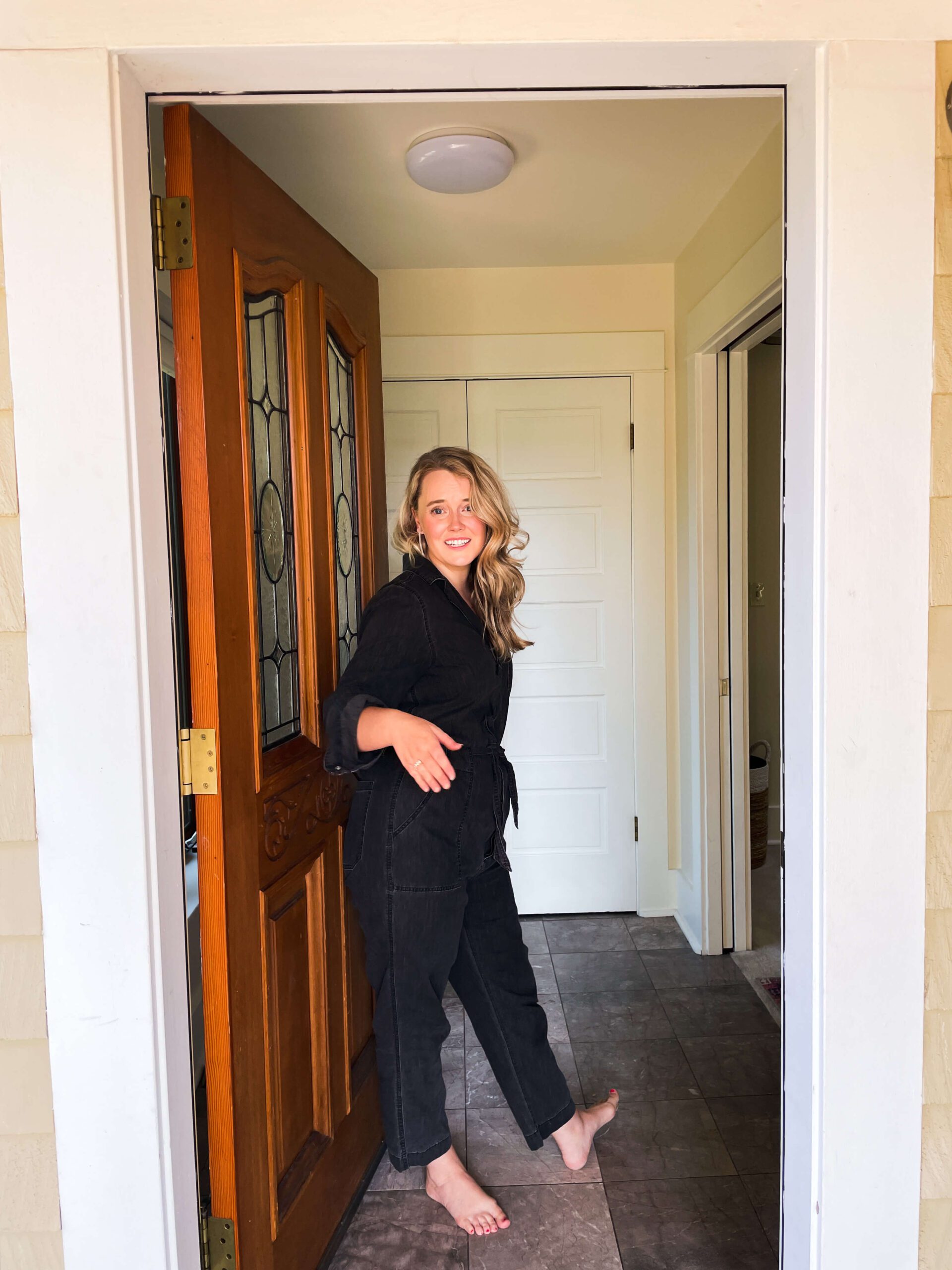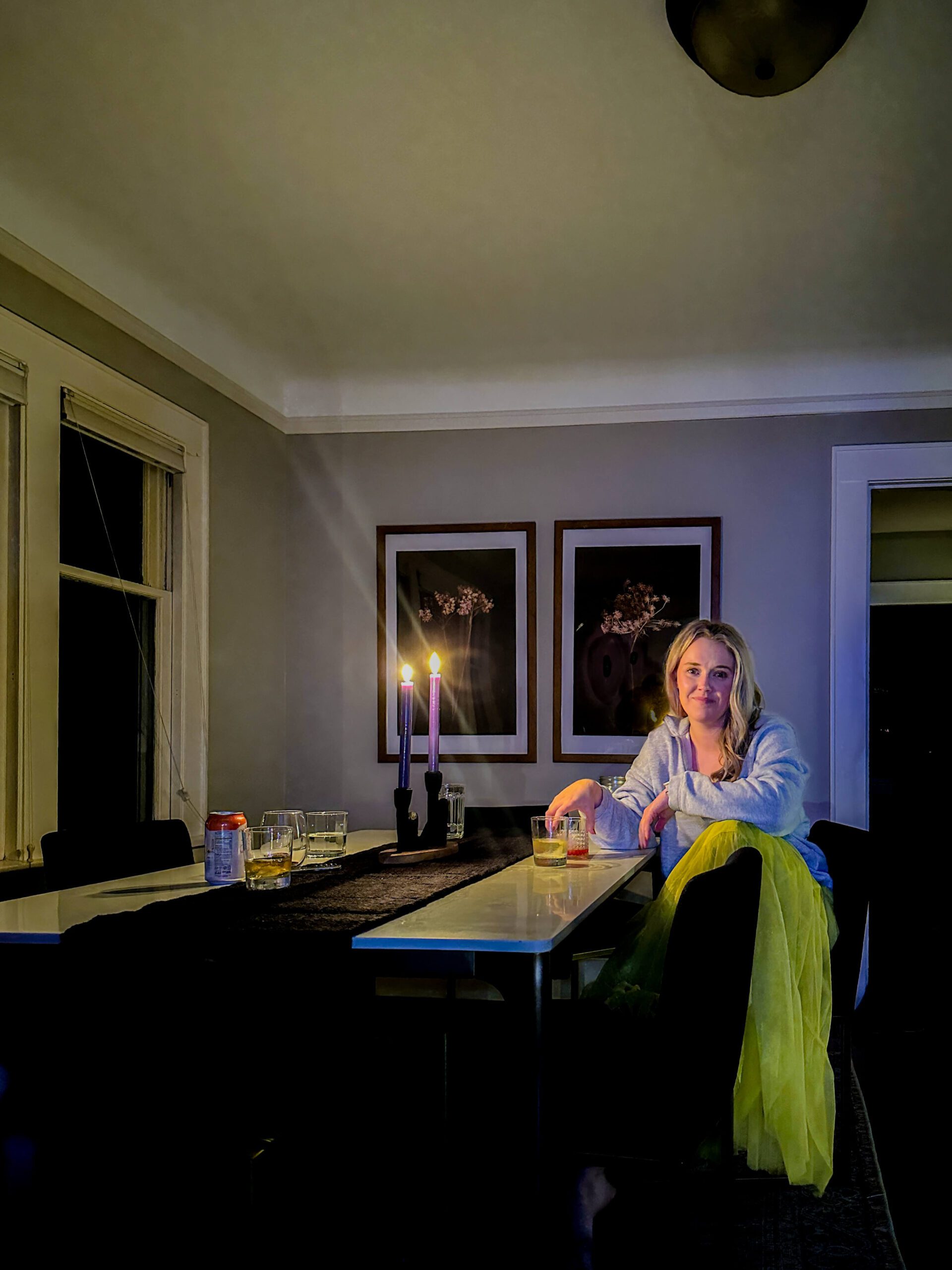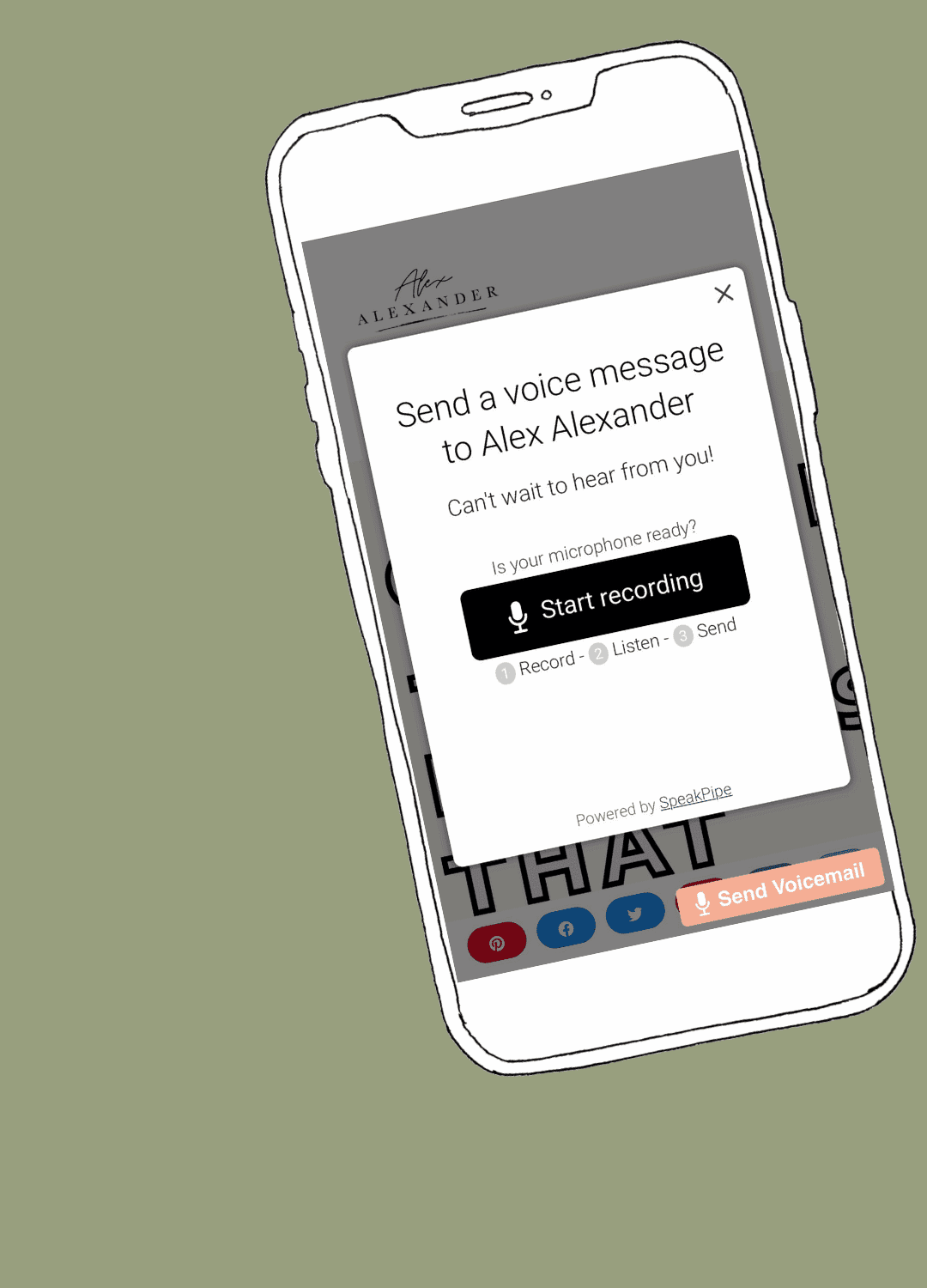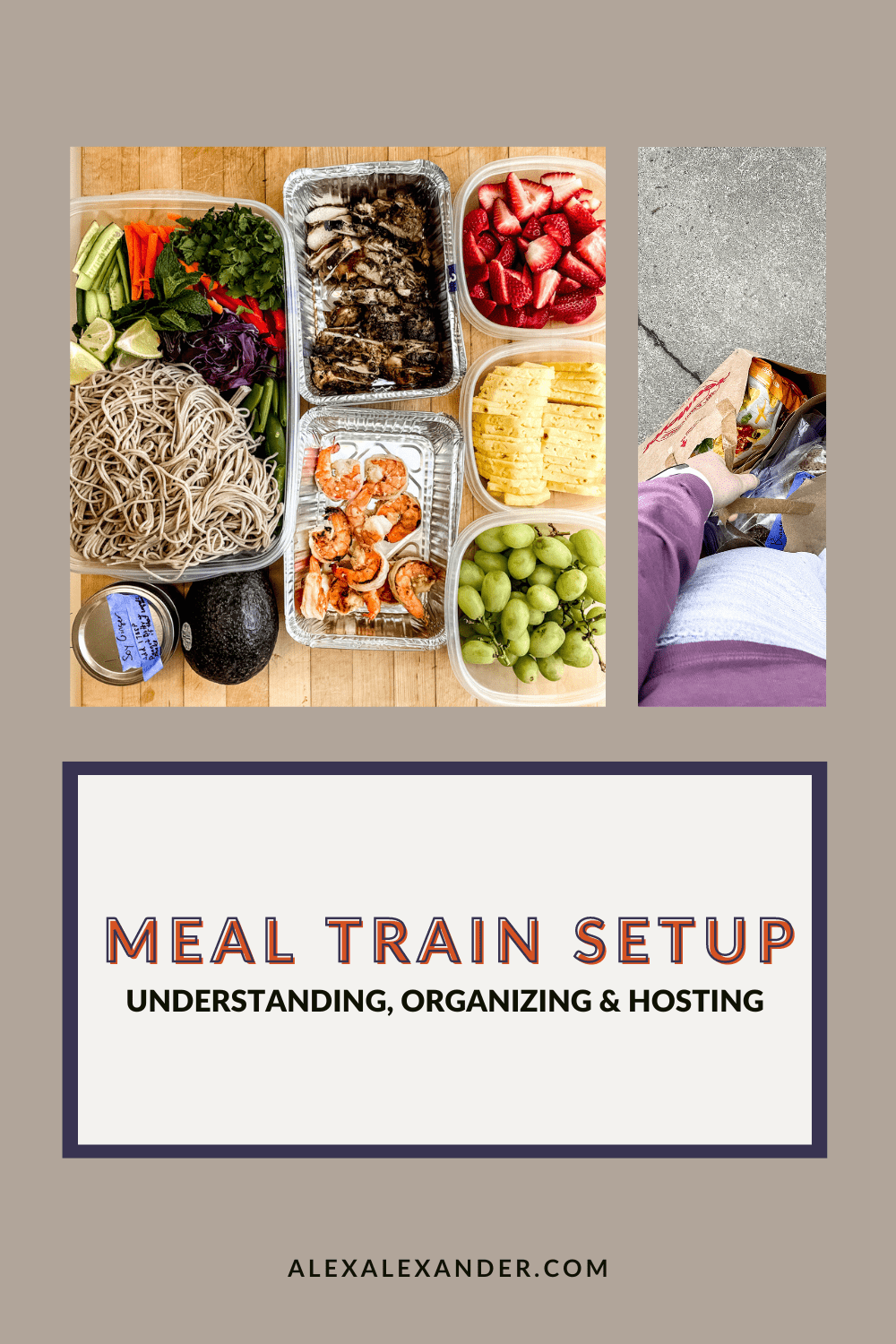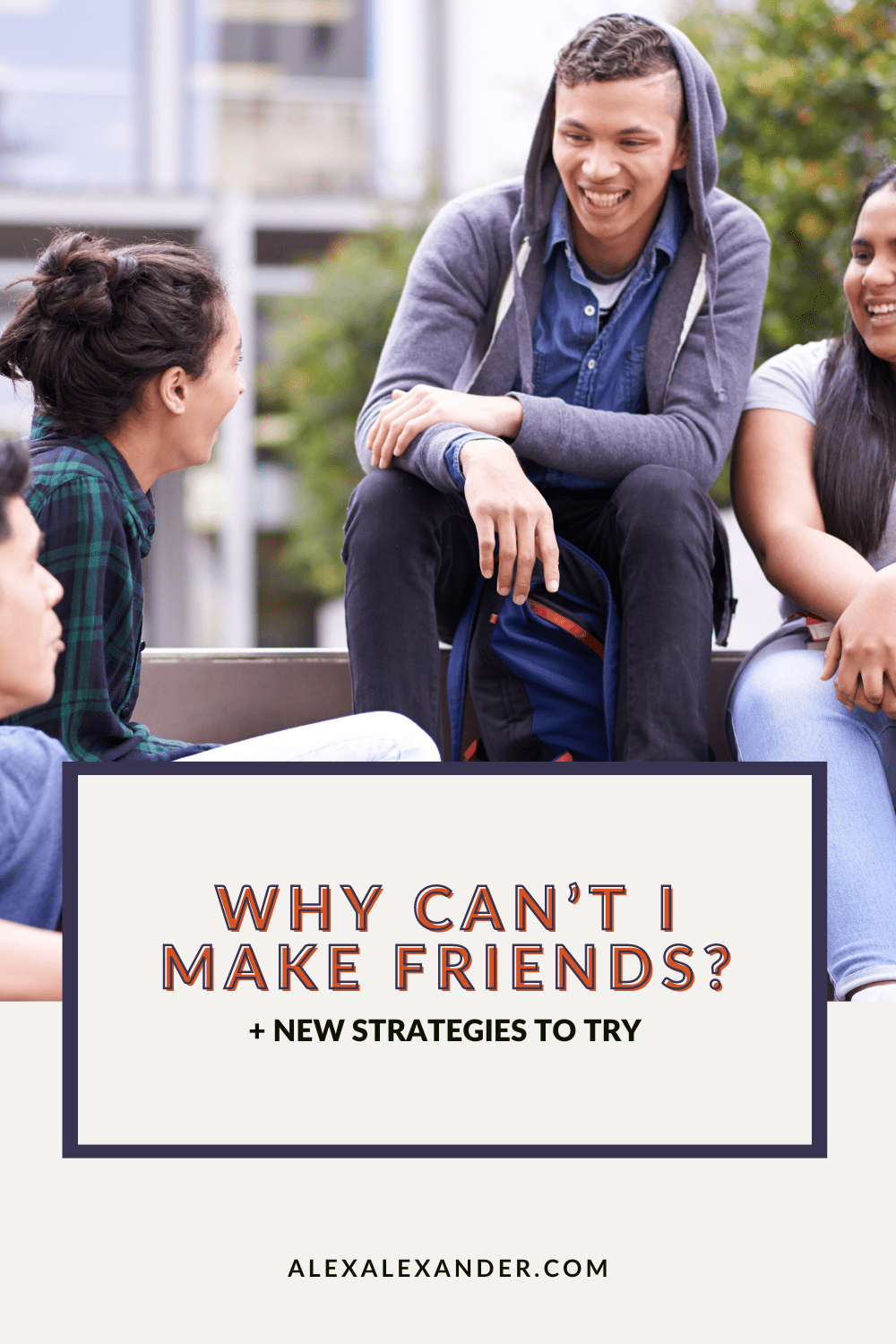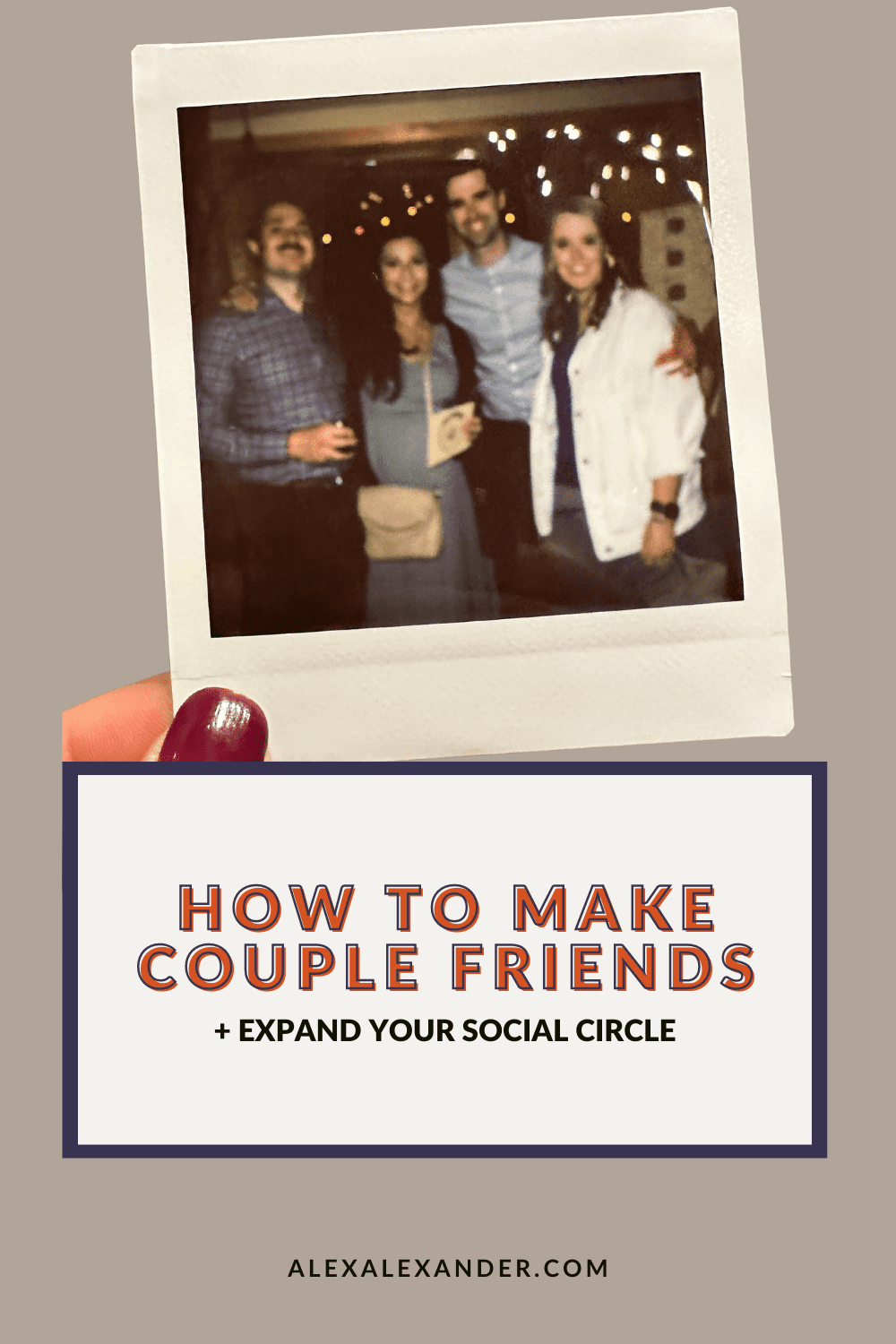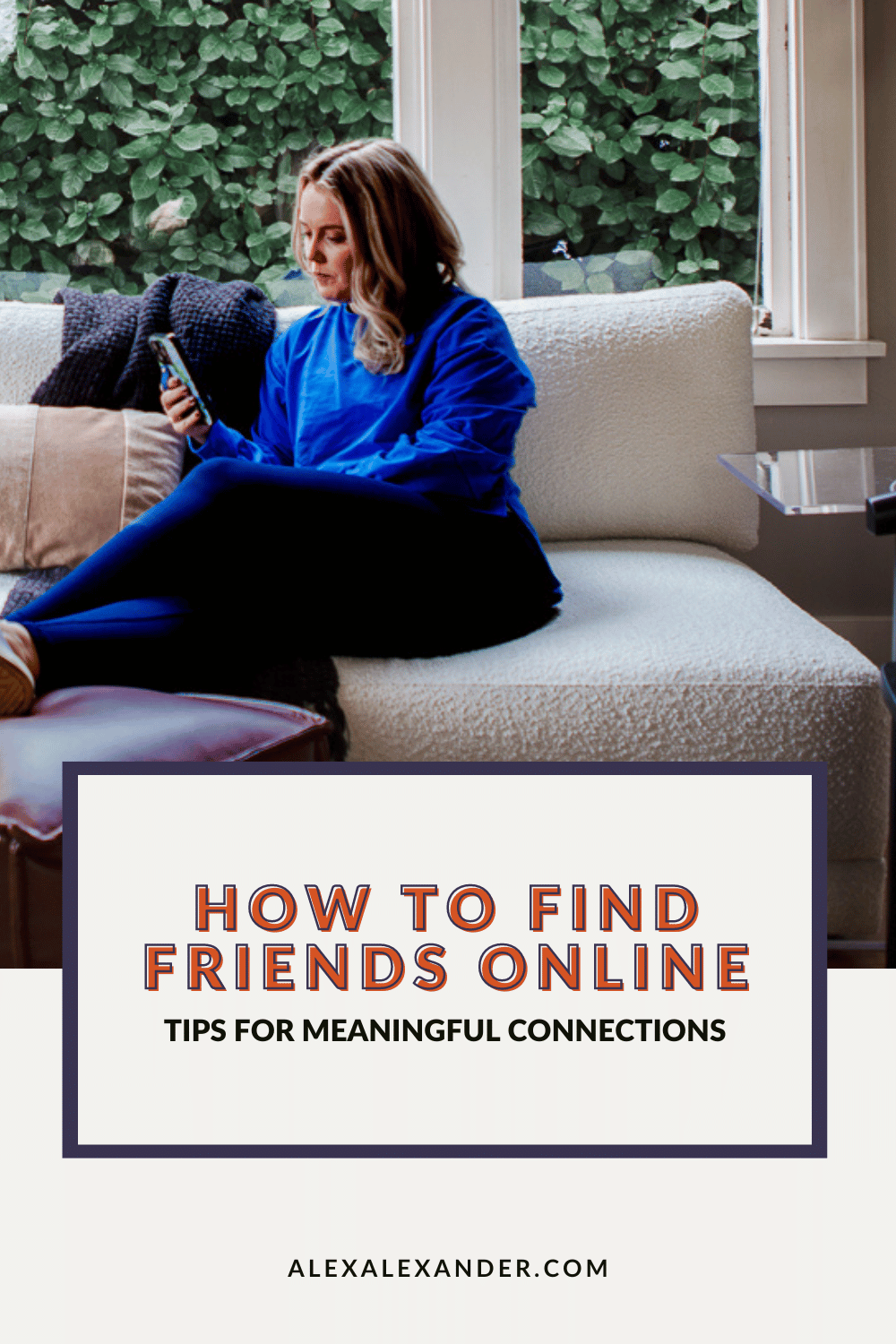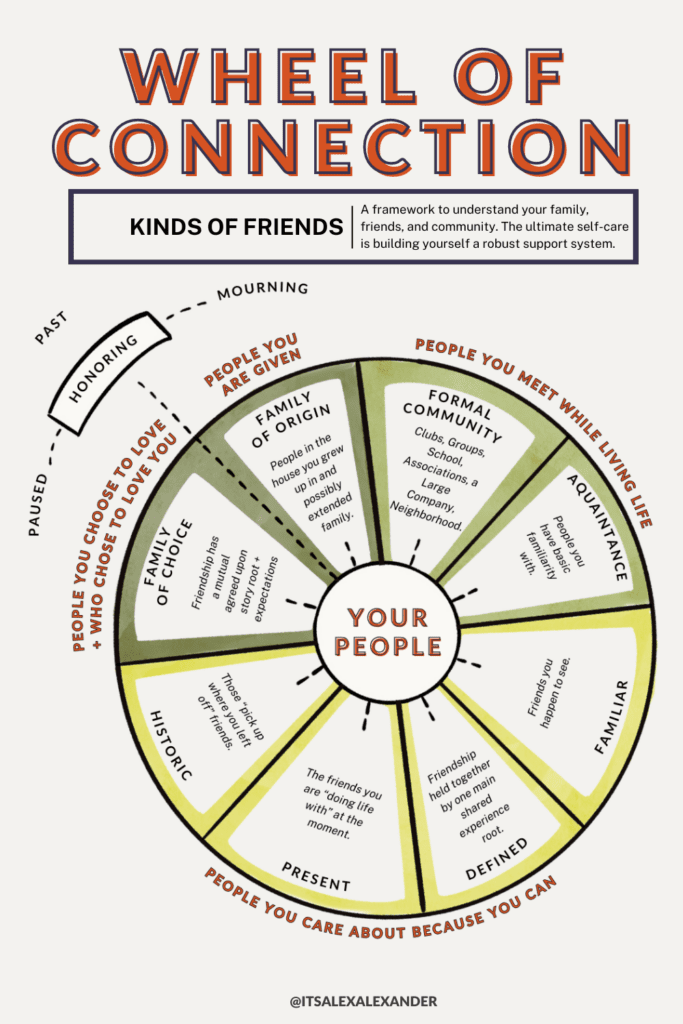
- Essential Types of Friendships
- How many different kinds of friends are there?
- Reasons to Reflect on the Different Types of Friends
- Importance of Different Friendships
- Simultaneously Nurturing Different Types of Friendships
- The Significance of Varied Friendship Roles
- The Evolution of Friendships Over Time
- Frequently Asked Questions
Did you know that throughout your lifetime, you will encounter approximately 80,000 different people? Among this vast array of people, you will form various types of connections – from casual acquaintances to close friendships with mutual interest. Some of these social relationships will fade into the realm of past friends, while others will remain present in your life. Some friendships may be consistent in one category, while others may shift between different categories over time.
As you explore the Wheel of Connection Framework I’ve created, I encourage you to see the potential in forming your unique support system with true friends. There is no one-size-fits-all approach – what truly matters is that it resonates with you. If something doesn’t feel right, it can guide you towards where to focus your energy. You may decide to nurture new friendships, deepen existing ones, adjust current relationships, or even release ties with past friends. The key is prioritizing what brings you joy and fulfillment in your social connections.
Essential Types of Friendships
Because everyone’s social circle is unique, the types of friendships they have will vary greatly. When asked about the essential types of friendships everyone should have, my response will always be the same – focus on the relationships that bring you joy, make you feel supported, and lift you up. There is no one-size-fits-all answer when it comes to the number or combination of friends you should have. Some people thrive with a large group of friends from different circles, while others find solace in a few close friendships or family connections. It’s also possible to find fulfillment in work relationships or casual acquaintances, depending on your current season of life. Remember, it’s okay to evolve and change the types of friendships in your life to create a support system that aligns with your needs at any given time.
HOW MANY DIFFERENT KINDS OF FRIENDS ARE THERE?
There are all types of friends and friendships out there— probably too many to list. But when it comes to the bigger picture, everyone can identify several common categories of people in their inner circle.
People change, friends come and go, and relationship dynamics shift with the inevitable transformations of life. Everyone’s support system looks different through different phases. This is normal. And friendships don’t have to remain so black or white.
You’ll notice that I also include family and community in my framework alongside friendship. That is because, although we try to separate these relationships, they are all connected. It is the cumulative impact of all the relationships in our life that build our support system., not just friendship or family. We also meet our friends in the community and enter the community through our family as young kids. Therefore, its all connected and I believe we need to start looking at it that way.
Through all my research and observations about friendships, here are a few of the types of friends included in my Wheel of Connection Framework:
FAMILY OF ORIGIN
Your family of origin is the people you grew up with— the family you were born into. In other words, they’re your blood family or legal family. These are the people who were present throughout your childhood.
Family of origin includes:
- Your parents or guardians
- Siblings
- Grandparents
- Cousins
- Aunts and uncles
- Some extended family
All these people count as friends. Why?
Because you share deep story roots with them, you likely go to them for support (or at least have in the past). But note: just because they might be related to you, it doesn’t automatically make them your family of choice.
FORMAL COMMUNITY
What groups of people do you share common goals with? With whom do you feel officially involved? These make up your formal community.
A formal community can include:
- Clubs and groups
- Work teams
- Business associates
- Classmates
- Neighbors
- Sports teams
- Places of worship
- Volunteer organizations
You likely have shared experiences with these people. But there’s room to grow, especially when it comes to feeling a sense of emotional intimacy.
ACQUAINTANCES
Acquaintances are people you’re familiar with but don’t specifically relate to. They’re people you recognize and loosely know but don’t necessarily share significant roots with.
Examples of acquaintances include:
- People at the gym
- Casual friends of your friends
- People in your extended network
- Parents at your kid’s school
- Virtual/social media friends
- Cashiers at the grocery store
You and your acquaintances likely share some experiences occasionally but have yet to develop emotional intimacy or deeper story roots.
FAMILIAR FRIENDS
Familiar friends are the people you see in your community but with whom you haven’t yet initiated quality time. Even though you wouldn’t call each other friends, you both appear in the same groups or social events, and you’re willing to make conversation when you see each other.
A familiar friend can be:
- A person you share simple/casual memories with
- Close friends of your friends
- People in your fitness class
- Neighbors you catch up with
- Parents you see regularly at your child’s sports league
- People you gravitate toward in a room full of strangers or acquaintances
You and your familiar friends might share a sense of belonging, a common interest, or a main friend group. You likely enjoy each other’s company when you happen to be in the same space, but there’s still potential for developing a deeper bond.
DEFINED FRIENDS
A defined friend is someone you probably refer to as a friend or buddy regarding a certain activity. For example:
- Workout friend
- Mom friends
- Drinking buddy
- Work wife
- Hiking buddy
- Concert pals/festie besties
These types of friendships revolve around a shared root experience, like partnering up for foodie adventures or going surfing twice a month. You likely share varying levels of emotional intimacy with them— some defined friends feel close; others fade away when the shared experience comes to an end.
PRESENT FRIENDS
Present friends are the close friends you’re currently “doing life with.” You are actively present and involved in each other’s lives.
Present friends are:
- People who make you feel deeply supported
- Friends you share traditions or routines with
- Your partner/spouse
- Friends you call to share big news
- Those you can trust with intimate information
- Friends who challenge each other to grow
Some present friends might be lifelong, but they don’t have to be. Society often defines “best friends” as those who have the longest history together. But there are many kinds of present friends, and they can ebb and flow with life circumstances.
HISTORIC FRIENDS
Historic friendships may have felt like close, present bonds at some point, but now it takes more effort to reconnect. Some historic friends are those for whom you can say, “We always pick up where we left off.” Think:
- Childhood best friends
- College friends
- Long-time family friends
- People who were friends for a time, but not anymore
- Relationships that had a long history
Historic friends are one of the common types of “best friends” people think of. But so-called best friends— what I prefer to call present friends— don’t have to be historic.
Historic friends share strong story roots, emotional intimacy roots, and many experience roots from the past. These friendships may have changed, paused, or fizzled out for whatever reason but they still hold a significant role in your story.
FAMILY OF CHOICE
Your family of choice is the people you’ve chosen to receive care from and who you mutually care about deeply.
The term “chosen family” originated from strong community groups that developed among those who lacked society’s expected level of care and support from a family of origin. LGBTQ+ communities, recovery support groups, and cultures facing discrimination helped evolve the concept of chosen family.
Really, anyone can create a chosen family. For example, your family of choice might include:
- Your partner/spouse
- Your children
- Friends that feel like family
- Personal mentors
- Close-knit communities who celebrate holidays and birthdays
Families of choice share a mutually agreed upon story root. They’re the people you share close bonds and expectations with, who help you when you ask, and who are by your side in times of need or celebration.
PODCAST EPISODE! Let’s talk about Chosen Family!
Now that you know the various kinds of friends in your life, what do you do with that information?
REASONS TO REFLECT ON DIFFERENT TYPES OF FRIENDS
You might be thinking, “Why should I categorize my friends? Isn’t that kind of judgmental?”
But I’m not asking you to rank anyone here. I’m not suggesting you categorize friendships for the sake of separating people or compartmentalizing your life.
Reflecting on the current status of your relationships is a way to determine where they’re at— and where you want them to be. How do your friendships feel? How do you want them to feel?
I created this “types of friends” list to help people find value in all their relationships. Not only to find value but to create more value in their communities.
Want to be a little more intentional about your connections and a little less overwhelmed with what you think friendship “should” be?
Importance of Different Friendships
When we were younger, life was simpler. We didn’t have as many responsibilities and roles as now in adulthood. Our friends as children and young adults played a significant role in our lives, but as we grow older, we realize that one person cannot fulfill all our needs. Like how different friendships served different purposes in the past, we now understand the importance of having a diverse group of friends to support us in various aspects of our lives. Each friend brings something unique to the table, enriching our experiences and providing different perspectives that help us navigate the complexities of adulthood.
Think about it – in high school and college, most of your friends likely lived in your community, went to the same school, and participated in the same sports and clubs you did. They had a lot of overlap with you, your season of life, and your experiences. That isn’t the case as adults. Therefore, we need to take responsibility for building a set of connections that supports all the unique parts of us, our passions, and our roles as adults. We are more complex, and therefore, our social networks will be too.
Simultaneously Nurturing Different Types of Friendships
It can be challenging to navigate multiple friendships and relationships at the same time. By exploring the Roots of Friendship Framework and the Wheel of Connection Framework, you can gain insight into what holds your friendships together and the roles they play in your life. This understanding will help you determine where to focus your energy – whether it’s maintaining, transforming, or letting go of certain relationships.
The lack of clear frameworks and language for friendships can make it difficult to invest in these relationships effectively. But with the two frameworks provided, you can move from random actions to intentional investments in your friendships. This shift will allow you to be more purposeful in directing your energy and attention in various relationships.
The Significance of Varied Friendship Roles
So often, we are told to seek out friends who are always supportive, positive, and encouraging. While these qualities are important, we need to recognize that not all friends can fulfill every role in our lives. Each friend may have their strengths and limitations when supporting us in different areas. That’s why it’s crucial to have a diverse group of friends who can fill various roles. You might have a friend who is great at encouraging your career goals, another who supports your relationship aspirations, and yet another who cheers you on in your travel adventures or passion projects. By building a network of friends who excel in different areas, you can ensure you have the necessary support and encouragement for every aspect of your life.
The Evolution of Friendships Over Time
Society often emphasizes maintaining friendships for a long time, but I believe it’s more important for our friendships to be in tune with our current stage of life. This means that our closest friends may not necessarily be the ones we’ve known for the longest time but rather those who support us and understand us in the present moment. These “Present Friends” play a crucial role in our lives, offering companionship and connection that align with where we are. Let’s challenge the notion that longevity equals strength in friendships and instead focus on the quality and relevance of the relationships we have in the here and now.
We may also have lifelong friends – those from childhood, high school, or college – who hold a special place in our hearts. Our bond with them is rooted in years of shared experiences and memories. These friends have seen us grow and change, and we have a deep emotional connection with them. While we may not see each other as often as we used to, these historic friends are still an important part of our lives. We cherish our history together and support each other through new seasons and challenges, even if we are not as present in each other’s daily lives. It’s essential to recognize the value these friendships bring, even if they have evolved.
Frequently Asked Questions
How do community acquaintances contribute to our lives?
There is often a focus on friendships but very little on how we meet our friends, which, more often than not, we meet friends when we are out in the world living our lives.
There is often a strong emphasis on the importance of friendships, but we shouldn’t overlook the role that community and acquaintances play in our lives. These connections are often formed while going about our daily lives, providing a sense of familiarity and belonging in our day-to-day experiences. It’s important to recognize the value that these relationships bring to our lives. If you’re interested in learning more about the impact of these simple connections, I recommend checking out my episode on the Liking Gap.
What is the significance of work and casual friends?
We spend a lot of time at work and engaging in our hobbies and passions. Therefore, I’d venture to say that these relationships are important. They are people that we connect with regularly. So when someone asks me, “Is my work friend my real friend?” I often follow up with, “What makes someone a friend?” Listen to Episode #4 of the Friendship IRL podcast to explore “What is a Friend, and in the meantime, just know that friendship is a spectrum, and although your work friends and casual friends might not be your closest friends, there is value in those connections.
How do close friendships differ from lifelong ones?
Both present and historic friendships can be lifelong or close, but it is crucial to distinguish between the two to manage expectations effectively. Understanding whether a friendship is more present or historic will greatly impact the dynamics and longevity of the relationship. By aligning expectations, friendships can thrive and withstand the test of time, evolving through different stages while remaining strong and fulfilling.

